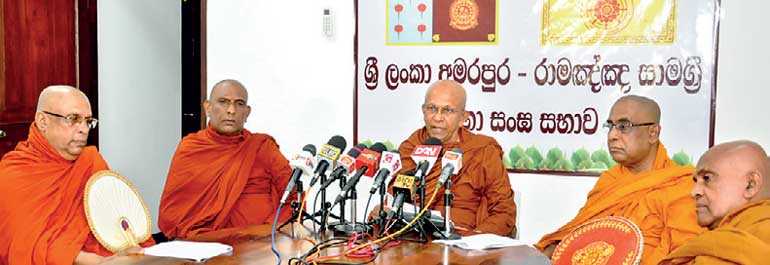Monday Feb 23, 2026
Monday Feb 23, 2026
Tuesday, 13 October 2020 01:34 - - {{hitsCtrl.values.hits}}

Sri Lanka Amarapura Maha Sanga Sabhawa Maha Lekhakadhikari Ven. Dr. Pallekande Rathanasara Thera, Sri Lanka Ramanna Maha Nikaya Maha Lekhakadhikari Ven. Aththanage Sasana Rathana Thero, Ven. Dr. Madampane Assaji Thera, Ven. Kithalagama Hemasara Thera and Ven. Waleboda Gunasiri Thero – Pic by Lasantha Kumara
By Chandani Kirinde
The Amarapura and the Ramanna Maha Nikayas yesterday made a joint appeal to the Government to withdraw the 20th Amendment to the Constitution warning that its enactment would seriously undermine democracy in the country and pave the way for authoritarianism and despotism.
The Secretaries of the two Nikayas, in a joint statement, called on President Gotabaya Rajapaksa and Prime Minister Mahinda Rajapaksa not to go ahead with the enactment of the Bill, and also urged all Members of Parliament (MPs) to reject it.
“This Constitutional amendment is regressive and paves the way for an undeveloped tribal society that will seriously impede progressive characteristics of human society such as freedom of thought and action,” said Sri Lanka Amarapura Maha Sanga Sabha Venerable Maha Lekhakadhikari Dr. Pallekande Rathanasara Thera.
He added that the proposed 20th Amendment rejects the core values of democracy, and urged the Government to take steps to draft a new Constitution that upholds democracy and rule of law without barring such amendments.
The Thera said that the Amarapura - Ramanna Samagi Maha Sanga Sabha has discussed the proposed Constitutional amendment at length and decided that it should not be passed.
“The enactment of this Bill will be the death knell for democracy in the country. We strongly emphasise that fact and request that this be withdrawn,” the Thera told reporters at a press briefing.
Sri Lanka Ramanna Maha Nikaya Maha Lekhakadhikari Venerable Aththanage Sasana Rathana Thero, who also addressed the media, said that there is no justification for bringing the 20th Amendment to overcome the shortcomings in the 19th Amendment.
He said that the 19A was clearly a law that strengthened the sovereignty of the people. He cited some of the progressive features that were put in place by 19A, including repealing the 18th Amendment which sought to make it possible for one person to be President for life if they so wished, restricted foreign citizens from becoming members of Parliament or the President, established the Constitutional Council (CC) to oversee appointments to important positions in the public service, established the independent commissions and subjected the appointment of judges to the superior courts by the President, to the approval of the CC.
The members of the Buddhist clergy said that from 1978 onwards, they have opposed the present constitution because of its authoritarian nature.
“At present most countries in the world have based their government systems on the democratic principle that the three branches of the state, i.e. Legislature, the Executive and the Judiciary, should keep the equilibrium by means of checks and balances. In 1978, introducing a new Constitution former President J. R. Jayewardene undermined this system of checks and balances and concentrated unprecedented powers in the Executive branch of the Government,” Venerable Sasana Rathana Thera said. He said it was 37 years later, in 2015 that the 19th Amendment to the Constitution was enacted, and restored these checks and balances.
“The proposed 20th Amendment once again threatens democracy by undermining the system of checks and balances. The process will mark the birth of authoritarianism and despotism,” he said.
The Theras described the 20th Amendment as a regressive piece of legislation and said it will add negativity and undemocratic features to the present Constitution.
They said the 20th Amendment will bring the public service under direct political authority, invalidate the mandate and independence of MPs, remove the independent mechanism for holding elections, challenge the independent existence of the judiciary, abolish the right of the people to go before the judiciary seeking justice, and open up space for embezzlement, fraud and corruption.
“It is quite clear what the country needs now is a new Constitution that suits a modern nation to face challenges and steer the country forward, and not another Amendment that undermines and paralyses aspects of democracy and humanity,” Venerable Sasana Rathana Thera said.
The clergy called on the Government to initiate a broad public discourse on a new Constitution that suits the country and ensure that the 20th Amendment is not enacted.
The two Nikayas that represent over 20,000 members of the Buddhist clergy and around 6,000 temples across the country, said they would seek the support of the other Buddhist Nikayas as well as civil society to oppose 20A.
Venerable Dr. Madampane Assaji Thera, Venerable Kithalagama Hemasara Thera and Venerable Waleboda Gunasiri Thero also spoke at the press conference.